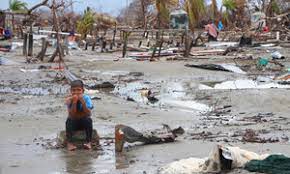As the global aid community marked World Humanitarian Day on Thursday, UN chief António Guterres paid tribute to all those who help people in need and urged support for the day’s #TheHumanRace campaign, which aims to protect the most vulnerable people from the climate emergency.
“Humanitarian workers are here to help the world’s most vulnerable people when disaster strikes”, the Secretary-General said.
“But around the world, aid workers face growing threats. In the past 20 years, shootings, kidnappings, and other attacks on humanitarian organisations have increased tenfold. This year alone, at least 72 humanitarian workers have been killed in conflict zones.”
This year’s campaign for World Humanitarian Day – #TheHumanRace – underscores how climate extremes are wreaking havoc across the world and overwhelming frontline responders.
Guterres warned that the climate emergency “is a race we are losing. But it’s a race we can and must win.”
Hosted on exercise platform Strava, participants are asked to clock 100 minutes of exercise for the World Humanitarian Day campaign.
“They can run, roll, ride, walk, swim, kick or hit a ball, each action will count towards helping us carry our message to world leaders when they meet at the UN Climate Change Conference (COP26) in November,” said UN humanitarian coordinating office, OCHA, which organised the campaign.
Insisting that climate change is the “defining issue of our times”, the UN migration agency (IOM) pointed to the global experience of extreme temperatures, rising sea levels, drought and storms.
For World Humanitarian Day 2021, IOM Director-General Antonio Vitorino urged the international community to focus on the vulnerable populations worst-hit by climate change – and the many “climate migrants” that will likely be forced away from their communities.
“Last year, more than half of all new displacements worldwide were due to weather-related disasters”, Vitorino said. “Millions lost their homes, access to food and water and their entire livelihoods due to worsening and more frequent climate hazards”.
With additional pressures on humanitarian aid delivery created by the COVID-19 pandemic, the IOM chief underscored how frontline workers were stretched even further than before.
“The climate emergency is a race against time”, he said, urging Governments, the private sector and concerned citizens to help scale up emergency preparedness and resilience building, along with climate change adaptation and mitigation.
SOURCE: UN NEWS CENTRE/PACNEWS














